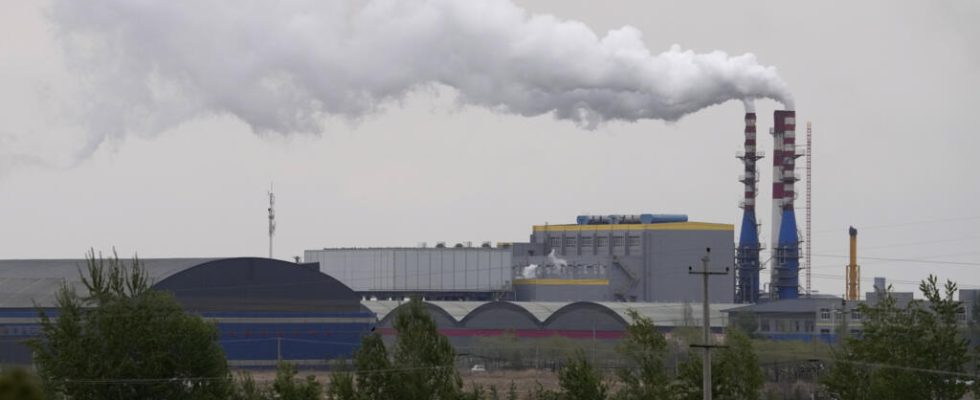Are European companies tired of China? In any case, this is what the annual survey by the EU Chamber of Commerce in Beijing, published this Friday, May 10, suggests. The report points to an “all-time low” in confidence for entrepreneurs. Some are even thinking of leaving.
5 mins
From our correspondent in Beijing,
Among the 529 member companies of the European Chamber of Commerce in China who responded to this investigation, only 13% envisage the second largest economy in the world as their first investment destination in the future – unheard of at this level – and 13% no longer believe in it, or in any case say they no longer want to invest in China in the future. This pessimism and this drop in appetite for China on the part of investors could mark the start of a “negative circle”, estimates the institution which calls on Beijing to take concrete measures to restore business confidence.
Trump tax and legal uncertainty
A call to which the Chinese authorities can respond only in part, because the reasons for this disaffection of investors are numerous, confides to RFI this French automobile entrepreneur established for twenty years in the greater Beijing and on the verge of relocating his company to Vietnam. You don’t change your life in one day. “Morale is pretty good, he said, but it is true that there is a more tense commercial and industrial context in China and I see it through my suppliers. »
THE post-Covid slowdownbut also and above all the Sino-American trade war and legal uncertainty led the latter to think about leaving. “First of all, there is the Trump tax which was not abolished by Biden and which makes everything manufactured in China destined for the US more expensive by 25%. The second reason is that the Chinese government forced us to resell our land and our factory, therefore a lack of legal security which made us think about moving, knowing that in industry, we could not relocate to Beijing And in his region. This is not possible for everything automotive and these two factors are pushing us to leave China. »
Internal and external factors cause clouds to accumulate: “Companies are starting to realize that some of the pressures in the global marketplace, as well as the competition with us, have really taken on a permanent nature,” says Jens Eskelund, the president of the EU Chamber of Commerce in China.
Read alsoChina: economic growth more solid than expected in the first quarter of 2024
Sluggish consumption and industrial overcapacity
More than two-thirds of respondents said doing business in China had become more difficult, marking the highest proportion ever recorded. “The lifting of restrictive measures linked to the pandemic initially gave businesses a sense of optimism,” the report says again. “However, it soon became clear that there would be no rapid recovery. » Result, according to the Chamber of Commerce, the former workshop of the world is not “no longer the obvious choice for everyone », while weak domestic consumption and Chinese industrial overcapacity, particularly in the field of electric cars and civil engineering, darken the horizon.
“As the Chinese economy faces headwinds and President Xi Jinping calls for self-sufficiency and the pursuit of a development model focused on production and debt, despite the reluctance of the West , businesses feel less welcome than before,” reports the agency Reuters. “Companies continue to shift planned investments in China to other markets, perceived as more predictable, more reliable and more transparent,” says the Chamber of Commerce again.
This also applies to some Chinese companies: “Every time I visit factories in Vietnam, one in two tenants is Chinese and comes to transform ‘made in China’ into ‘made in Vietnam’, adding a few transformations to avoid the Trump tax,” says our French witness who has visited Hanoi five times in the last three months.
Also listenEurope shows its muscles against China
Relocations in Southeast Asia
Association of Southeast Asian Nations countries have been the main beneficiaries of this relocation of foreign investment, with 21% of respondents having moved – or considering moving – part of their initially planned investments there. for China, notes the South China Morning Post.
In addition to the pandemic and the real estate crisis which have highlighted certain limits to development, the United States/China decoupling and the resulting autonomy strategy of the second largest economy in the world could accelerate the disenchantment of investors. Many European companies in China have their eyes fixed on the White House and the elections in the United States in November. Knowing that before that, the strengthening of export controls announced by Washington in terms of semiconductors in particular, could have an impact on a large part of EU companies operating in China.
This pessimism about investment prospects seems to weigh more heavily on European companies caught between Chinese and American pressures. This depression which seems to have taken root since Covid does not apply to all sectors and a large part of European companies continue to depend on this continental market, despite consumption which is struggling to restart. “This survey was carried out last January and February, it does not take into account the various announcements made to foreign companies by the authorities since then,” notes a Chinese analyst. Announcements that will struggle to erase structural problems all at once. While three-quarters of those surveyed plan to reinvest part of last year’s profit in China this year, more than a third say they will reinvest less than in the past.
Read alsoChina: the increase in sales and industry does not cancel out the effects of the real estate crisis
